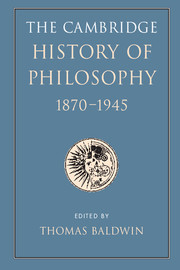Book contents
- Frontmatter
- Contents
- List of contributors
- Introduction
- I 1870–1914
- 1 Positivism, Idealism, and Pragmatism
- 1 Positivist thought in the nineteenth century
- 2 Neo-Kantianism: the German idealism movement
- 3 Idealism in Britain and the United States
- 4 Idealism in Russia
- 5 Bergson
- 6 Pragmatism
- 2 Psychology and Philosophy
- 3 Logic, mathematics, and judgement
- 4 Philosophy and the new physics
- 5 The idea of social science
- 6 Ethics, politics, and legal theory
- 7 Philosophy of religion and art
- Interlude
- II 1914–1945
- Biobibliographical appendix
- Bibliography
- INDEX
- References
5 - Bergson
from 1 - Positivism, Idealism, and Pragmatism
Published online by Cambridge University Press: 28 March 2008
- Frontmatter
- Contents
- List of contributors
- Introduction
- I 1870–1914
- 1 Positivism, Idealism, and Pragmatism
- 1 Positivist thought in the nineteenth century
- 2 Neo-Kantianism: the German idealism movement
- 3 Idealism in Britain and the United States
- 4 Idealism in Russia
- 5 Bergson
- 6 Pragmatism
- 2 Psychology and Philosophy
- 3 Logic, mathematics, and judgement
- 4 Philosophy and the new physics
- 5 The idea of social science
- 6 Ethics, politics, and legal theory
- 7 Philosophy of religion and art
- Interlude
- II 1914–1945
- Biobibliographical appendix
- Bibliography
- INDEX
- References
Summary
At times of transition in the history of thought, we find thinkers who open and close doors, often in exploratory or surprising ways, and others who map out whole new programmes of enquiry. The sketch of Bergson’s work in this chapter will set it in context, and show it as opening and closing doors, rather than as providing a manifesto for a new philosophical programme.
ANALYSIS IN PHILOSOPHY
Nineteenth-century debates over positivism and idealism were displaced in time by other themes, in which a renewed interest in analysis had a major part. The analytic method had played a central role in European thought since Descartes. His invention of analytic geometry, and the later invention by Leibniz and Newton of the calculus, had been inseparable from major advances in natural science, as well as leaving their imprint upon philosophical work more generally.
But analysis, while not indifferent to the temporal dimension, treats it on the model of spatial dimensions (indeed, Descartes had described his physics, which was, after all, destined to give an account of physical change over time, as nothing but pure geometry). Now the nineteenth century had seen a new concern with diachronic explanation, whether as an idealist project in the wake of Hegel, or as a disciplinary project in linguistics (historical linguistics), in economics (Marx), in biology (Darwin, Mendel), in textual criticism, and so forth. This had, for the time, displaced the analytic method from its central (though contested) position as the key to our understanding of the phenomena of our world.
- Type
- Chapter
- Information
- The Cambridge History of Philosophy 1870–1945 , pp. 67 - 73Publisher: Cambridge University PressPrint publication year: 2003
References
- 1
- Cited by



